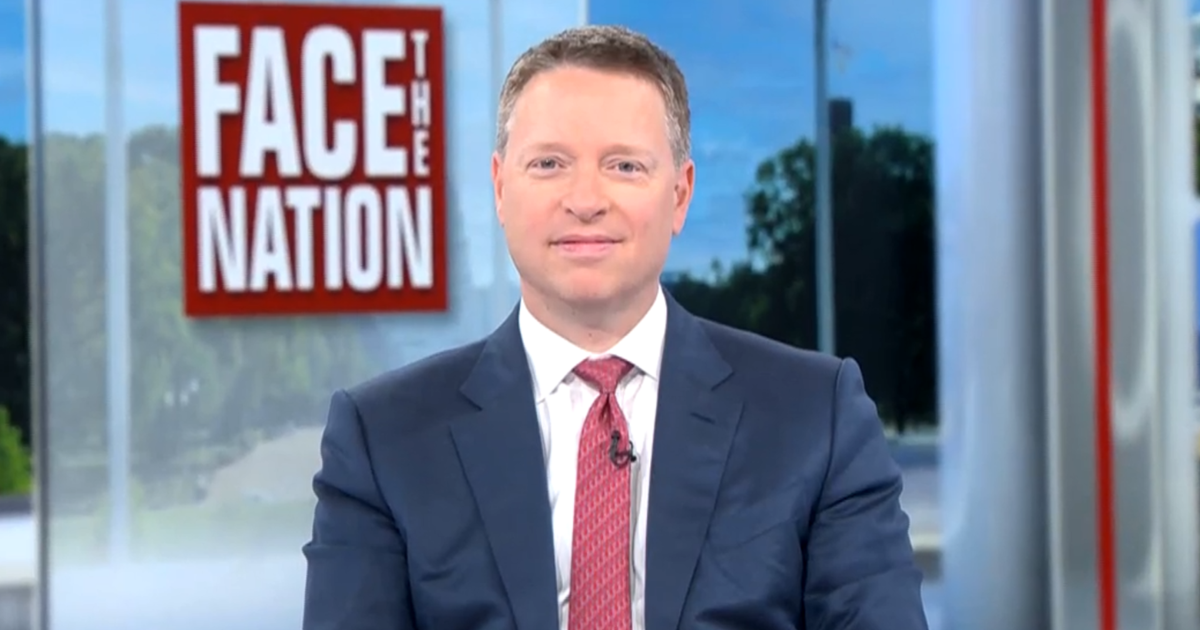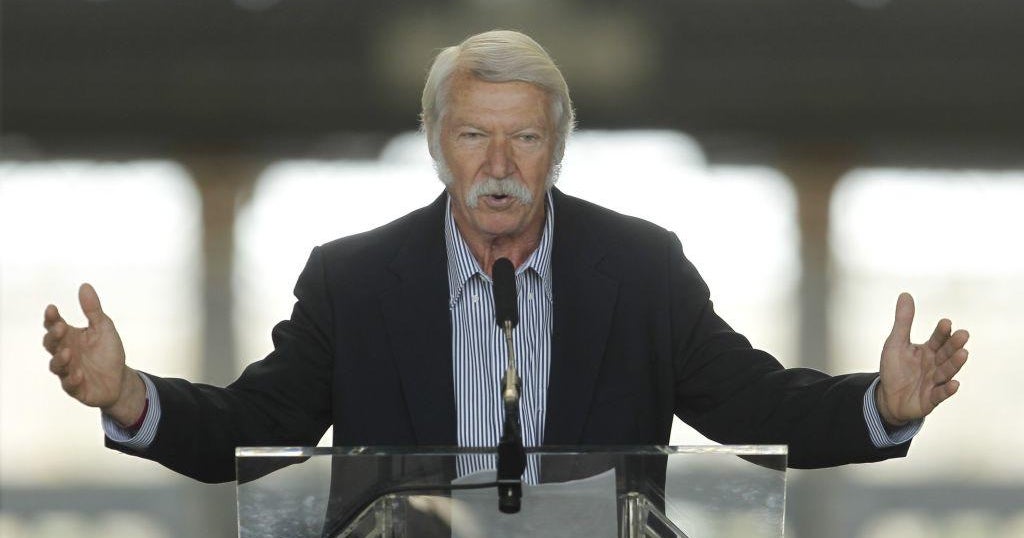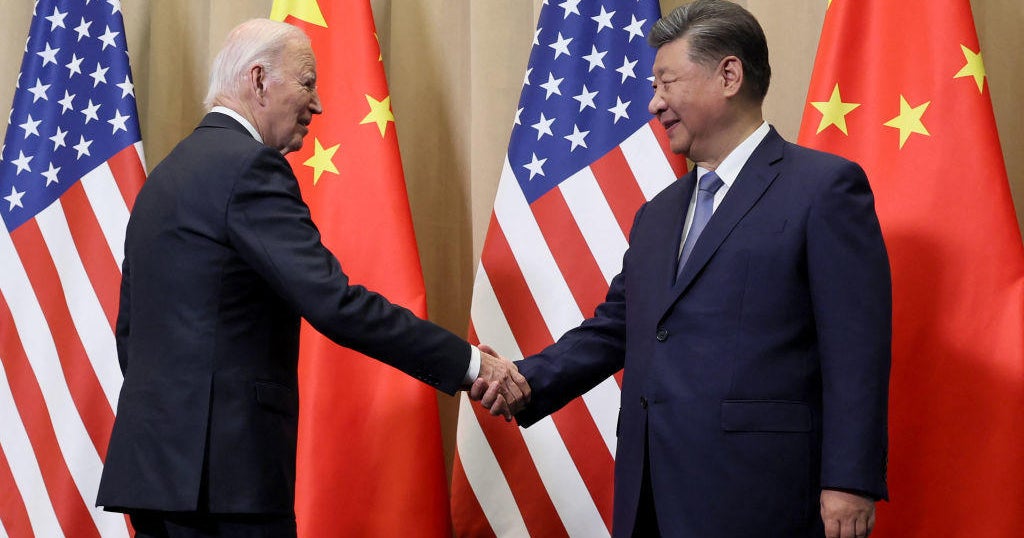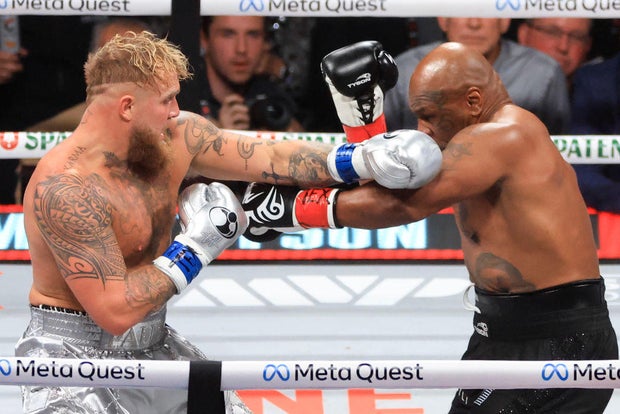CBS News
Transcript: Matt Pottinger, former deputy National Security Adviser, on “Face the Nation,” June 2, 2024

The following is a transcript of an interview with Matt Pottinger, who served as deputy National Security Adviser in the Trump administration, on “Face the Nation” that aired on June 2, 2024.
MARGARET BRENNAN: And we’re joined now with- by Matt Pottinger, who served as Deputy National Security Adviser in the Trump administration. He is the author of the new book, “The Boiling Moat: Urgent Steps to Defend Taiwan,” available in July. Matt, you say the clock’s ticking. Beijing has been engaged in the most comprehensive peacetime military buildup of any nation since World War II. Are you predicting that conflict will happen either on President Biden, or Pres- President Trump if he’s reelected, on their watch?
FORMER DEPUTY NATIONAL SECURITY ADVISOR OF THE UNITED STATES, MATTHEW POTTINGER: Well, what is clear is that the dictator in Beijing, Xi Jinping, intends to try to take Taiwan, to annex it by force if necessary. We also know that this would be catastrophic for American prosperity and security. But my co-authors and I are actually quite optimistic that this is a war that can be deterred. But it means that we’ve got to take some steps urgently. These are workable steps. It doesn’t require massive new investment. We’ve got the technologies we need. But Taiwan, Japan, and the United States in particular, need to take the steps that we think we’ve laid out in the book.
MARGARET BRENNAN: The- this week, the Defense Secretary is in Asia and he actually met with his Chinese Defense Minister counterpart. You can see it there. This is, like, the first meeting since 2022. Last guy disappeared. But Austin said, “a fight with China is neither imminent. . . or unavoidable.” When we hear the kind of rhetoric out of Washington right now, it sounds like we are headed towards conflict. What are the things you’re saying need to be done to avoid it?
POTTINGER: Yeah, well, for starters, we need to invest more in munitions making. Okay, so one of the things that the Chinese government is looking at is, would we be able to stay in a fight more than just the first, you know, the initial battle that would be involved in taking Taiwan? If they don’t think we have the industrial base, and right now, we haven’t optimized our industrial base to do that–
MARGARET BRENNAN: Even with the National Security Supplemental investment in the can?
POTTINGER: Absolutely. Look, we- we- amazingly, I don’t think many Americans realize, our defense spending right now is less than half of what it was in the 1980s during the Cold War. And that was during the Reagan administration. We didn’t have to go to war, partly because we put the money into that. Our military in terms of manpower is smaller today than it was on the eve of World War II. So we have to put more money into it, it’s- but we also have to do things to optimize our defense spending so that it’s not guaranteed profits, no matter how inefficient the manufacturers are. There are things that we can do to supercharge our- our military manufacturing to take advantage of our innovative base.
MARGARET BRENNAN: It’s interesting to hear you, and before you, the general, talk about the scale of the problem set facing the president of the United States and the next commander in chief. So that’s why I think it’s important to have this conversation this week. You did resign from the Trump administration after the violent attack on the Capitol on January the 6th, you then testified to Congress that you feared America’s national security was in harm that day, that it gave “ammunition to feed a narrative that our system of government doesn’t work,” the U.S. is in decline. “If you continue to contest an election, you’re not just contesting an election,” “you’re actually challenging the Constitution itself.” Do you fear that erosion is taking place right now with what we are hearing on the campaign trail?
POTTINGER: Well look, I- I think the perception of erosion is- I actually think the United States is incredibly strong. We have all of these advantages, the- this century can be ours if we don’t lose our nerve. I- I think that, look, Election Day will be a referendum. It’s the best kind of referendum. It’s where the American people get to decide who the next president’s going to be. I hope that the outcome is decisive so that we don’t end up with either side challenging the results. But if they do, just like with the last election, the- the courts will- will determine it. We have a system in place that allows us to adjudicate the outcomes of our election.
MARGARET BRENNAN: But now you even have, like, the ranking member of the Senate Intelligence Committee coming out and repeating things that undercut our judicial system, comparing the United States to the Soviet Union?
POTTINGER: Yeah, well, look, there- there- there’s no way–
MARGARET BRENNAN: What does Beijing think of that?
POTTINGER: Yeah, look, look, well- Beijing- it’s kind of an interesting moment, because Beijing really relishes propaganda that is designed to discredit the United States, or to cause us to doubt our- our system of government. But at the same time, you have a- a jury that has just convicted a president of the United States, you- you’ve also got the- the son of a sitting president who’s- who’s now under indictment, just like you heard from Preet Bharara earlier. Beijing’s propaganda can only go so far. At the end of the day, Americans- thank God we live in a system where the American people are going to decide who their president is. They- they have all the information available to them.
MARGARET BRENNAN: And we will try to bring- bring it to them here. Thank you very much, Matt. We’ll be right back.
CBS News
Bela Karolyi, polarizing U.S. gymnastics coach, dies at 82

Bela Karolyi, the charismatic if polarizing gymnastics coach who turned young women into champions and the United States into an international power, has died. He was 82.
A spokesperson for USA Gymnastics confirmed to CBS News by email that Karolyi died Friday. No cause of death was given.
Karolyi and wife Martha trained multiple Olympic gold medalists and world champions in the U.S. and Romania, including Nadia Comaneci and Mary Lou Retton.
Ron Jenkins/Fort Worth Star-Telegram/Tribune News Service via Getty Images
“A big impact and influence on my life,” Comaneci, who was just 14 when Karolyi coached her to gold for Romania at the 1976 Montreal Olympics, posted on Instagram.
The Karolyis defected to the United States in 1981 and over the next 30-plus years became a guiding force in American gymnastics, though not without controversy. Bela helped guide Retton — all of 16 — to the Olympic all-around title at the 1984 Games in Los Angeles and memorably helped an injured Kerri Strug off the floor at the 1996 Games in Atlanta after Strug’s vault secured the team gold for the Americans.
Karolyi briefly became the national team coordinator for USA Gymnastics women’s elite program in 1999 and incorporated a semi-centralized system that eventually turned the Americans into the sport’s gold standard. It did not come without a cost. He was pushed out after the 2000 Olympics after several athletes spoke out about his tactics.
It would not be the last time Karolyi was accused of grandstanding and pushing his athletes too far physically and mentally.
During the height of the Larry Nassar scandal in the late 2010s — when the disgraced former USA Gymnastics team doctor was effectively given a life sentence after pleading guilty to sexually assaulting gymnasts and other athletes with his hands under the guise of medical treatment — over a dozen former gymnasts came forward saying the Karolyis were part of a system that created an oppressive culture that allowed Nassar’s behavior to run unchecked for years.
Still, some of Karolyi’s most famous students were always among his staunchest defenders. When Strug got married, she and Karolyi took a photo recreating their famous scene from the 1996 Olympics, when he carried her onto the medals podium after she vaulted on a badly sprained ankle.
CBS News
Mike Tyson says he has “no regrets” after losing boxing match to Jake Paul

Despite losing his boxing match to Jake Paul, Mike Tyson in a social media post Saturday said he had “no regrets” to getting “in ring one last time.”
The boxing legend was defeated by social media star Jake Paul in a highly anticipated fight on Friday night with an age difference of over three decades between the two contenders.
Netflix said Saturday that 60 million households worldwide tuned in to watch the match. The two fighters went eight full rounds, with each round two minutes long. Paul defeated Tyson by unanimous decision and the 27-year-old upset boxer and 58-year-old former heavyweight champion hugged afterward.
Paul was expected to earn about $40 million from the fight, and Tyson was expected to take around $20 million for the fight, according to DraftKings and other online reports.
Getty Images
Tyson said on his social media that “this is one of those situations when you lost but still won. I’m grateful for last night.”
The fight almost didn’t happen after Tyson experienced an ulcer flare-up while on a plane in March. He addressed his illness Saturday, writing that he “almost died in June.” He said he had eight blood transfusions and “lost half my blood and 25lbs in hospital and had to fight to get healthy to fight so I won.”
Tyson retired from boxing in 2005 after a 20-year career. He last fought in a 2020 exhibition match against former four-division world champ Roy Jones Jr.
“To have my children see me stand toe to toe and finish 8 rounds with a talented fighter half my age in front of a packed Dallas Cowboy stadium is an experience that no man has the right to ask for. Thank you,” he said.
Alex Sundby and
contributed to this report.
CBS News
In their final meeting, Xi tells Biden he is “ready to work with a new administration”

In their final meeting, China’s leader Xi Jinping told U.S. President Biden that his nation was “ready to work with a new administration,” as President-elect Donald Trump prepares to take over.
The two leaders gathered Saturday on the sidelines of the annual Asia-Pacific Economic Cooperation summit. Mr. Biden was expected to urge Xi to dissuade North Korea from further deepening its support for Russia’s war on Ukraine. It marked their first in-person meeting since they met in Northern California last November.
Without mentioning Trump’s name, Xi appeared to signal his concern that the incoming president’s protectionist rhetoric on the campaign trail could send the U.S.-China relationship into another valley.
“China is ready to work with a new U.S. administration to maintain communication, expand cooperation and manage differences so as to strive for a steady transition of the China-U.S. relationship for the benefit of the two peoples,” Xi said through an interpreter.
LEAH MILLIS/POOL/AFP via Getty Images
Mr. Biden, meanwhile, spoke in broader brushstrokes about where the relationship has gone and reflected not just on the past four years, but on their long relationship.
“Over the past four years, China-U.S. relations have experienced ups and downs, but with the two of us at the helm, we have also engaged in fruitful dialogues and cooperation, and generally achieved stability,” he said.
Mr. Biden and Xi, with top aides surrounding them, gathered around a long rectangle of tables in an expansive conference room at Lima’s Defines Hotel and Conference Center.
There’s much uncertainty about what lies ahead in the U.S.-China relationship under Trump, who campaigned promising to levy 60% tariffs on Chinese imports.
Bobby Djavaheri, president of Los Angeles-based Yedi Houseware Appliances — which manufactures its products in China — told CBS News in an interview this week that such tariffs “would decimate our business, but not only our business. It would decimate all small businesses that rely on importing.”
Trump has also proposed revoking China’s Most Favored Nation trade status, phasing out all imports of essential goods from China and banning China from buying U.S. farmland.
Already, many American companies, including Nike and eyewear retailer Warby Parker, have been diversifying their sourcing away from China. Shoe brand Steve Madden says it plans to cut imports from China by as much as 45% next year.
White House national security adviser Jake Sullivan said Biden administration officials will advise the Trump team that managing the intense competition with Beijing will likely be the most significant foreign policy challenge they will face.
It’s a big moment for Mr. Biden as he wraps up more than 50 years in politics. He saw his relationship with Xi as among the most consequential on the international stage and put much effort into cultivating that relationship.
Mr. Biden and Xi first got to know each other on travels across the U.S. and China when both were vice presidents, interactions that both have said left a lasting impression.
“For over a decade, you and I have spent many hours together, both here and in China and in between. And I think we’ve spent a long time dealing with these issues,” Mr. Biden said Saturday.
But the last four years have presented a steady stream of difficult moments.
The FBI this week offered new details of a federal investigation into Chinese government efforts to hack into U.S. telecommunications networks. The initial findings have revealed a “broad and significant” cyberespionage campaign aimed at stealing information from Americans who work in government and politics.
U.S. intelligence officials also have assessed China has surged sales to Russia of machine tools, microelectronics and other technology that Moscow is using to produce missiles, tanks, aircraft and other weaponry for use in its war against Ukraine.
And tensions flared last year after Mr. Biden ordered the shooting down of a Chinese spy balloon that traversed the United States.






